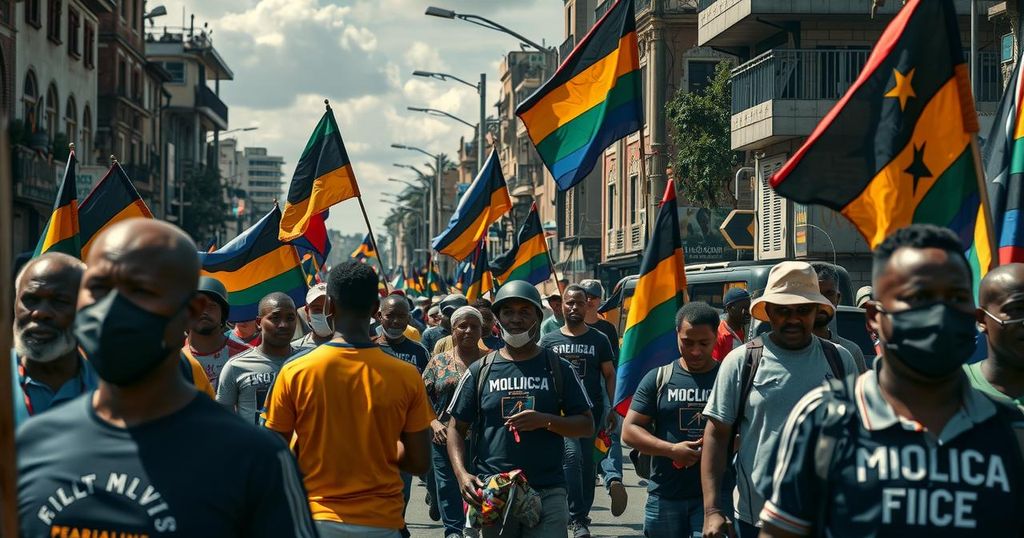Mozambique Protests Erupt Following Controversial Election Results, Claiming Lives and Political Aspirations

Following Mozambique’s recent elections, protests erupted against the ruling Frelimo party’s alleged electoral fraud, resulting in at least 11 deaths due to police violence, including that of Silvio Jeremias. Despite claiming a significant share of the vote, the opposition party Podemos challenges the results, citing widespread irregularities. Activists are now calling for justice and social change amid growing tensions in the country.
The political climate in Mozambique has intensified following the recent election results, which saw the ruling Frelimo party manage to secure a significant majority amidst widespread allegations of electoral fraud. Daniel Chapo, the party’s presidential candidate, officially garnered 70.7% of the vote. This was met with outrage and protests across the nation, resulting in the tragic deaths of at least 11 individuals due to security forces’ actions, including that of Silvio Jeremias, a petrol station worker who was shot during a protest. Reports indicated that approximately 50 individuals sustained serious injuries from gunshots, leading to heightened concerns regarding police conduct during the unrest. Protesters demanded justice and political reform, intensifying calls against Frelimo’s long-standing governance. Amid these protests, the opposition party, Podemos, claimed victory in the election with asserted support from a significant portion of the electorate, alleging a count of 53% along with a legal challenge to the results that they argue are marred by fraudulent practices, including the registration of fake voters. Furthermore, leads to violence and intimidation against opposition figures have been reported, raising alarm over the safety of those opposing the current regime. Civil society organizations and international observers have documented these irregularities, calling for accountability in a nation struggling with political stability. As the country confronts these horrific events, the mourning of victims like Jeremias has transformed into a powerful movement advocating for justice and the preservation of democracy. Amidst the outcry, activists and citizens are rallying to ensure their voices are heard, with demonstrators prominently displaying messages against state violence and in favor of democratic ideals. A chilling sentiment echoed in their chants, emphasizing a profound yearning for change within a nation marred by decades of political unrest.
Mozambique, a nation in southeastern Africa, has been under the governance of the Frelimo party since its independence in 1975. The recent elections on October 24, 2023, revealed the stark divide between the ruling party and the opposition, as accusations of rigging and manipulation surfaced. The youthful demographic of Mozambique, mostly under 18, demonstrates an increasing disillusionment with Frelimo’s policies, seeking alternatives in opposition candidates. Human Rights Watch and other entities have documented widespread violence and a pattern of targeting opposition figures, journalists, and activists, exacerbating the political tension in the country. The events following the elections indicate a critical moment for Mozambique, with potential for significant socio-political change depending on how current grievances are addressed.
The situation in Mozambique underscores a critical turning point in the nation’s political trajectory. The protests following the contentious election results have not only highlighted systemic issues of governance and electoral integrity but have also given rise to a vocal demand for accountability and reform. The tragic loss of life, notably that of Silvio Jeremias, serves as a somber reminder of the high stakes involved. As citizens unite in their calls for a democratic process free from violence and manipulation, the outcome of this unrest could be pivotal in shaping Mozambique’s future.
Original Source: www.theguardian.com







